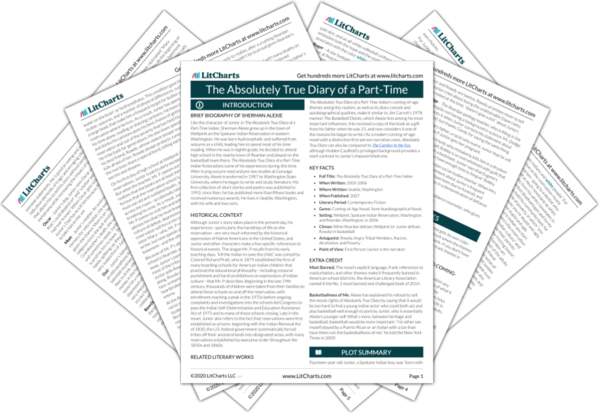Junior often sees himself and his world in terms of strict dichotomies: white versus Indian, friends versus enemies, rich versus poor. In his double life in Reardan and on the reservation, he feels “like a magician slicing himself in half, with Junior living on the north side of the river and Arnold living on the south.” Yet just as his true identity includes both Junior and Arnold, the divided extremes he describes often turn out to be blurred. Roger, the Reardan student who greets Junior in the schoolyard with a horribly racist joke, becomes a kind friend and role model; Rowdy is both Junior’s best friend and his worst enemy, and hates him because he loves him so much. Things like the crumpled five-dollar bill Junior’s alcoholic father gives him for Christmas are both ugly and beautiful, and the basketball game Reardan wins against Wellpinit becomes both a triumphant victory and a shameful moral loss for Junior when he realizes how many social and economic advantages his team has. Meanwhile, tragic events such as Junior’s sister Mary’s death have darkly comedic elements, and Junior’s ability to address topics like bullying, poverty and racism with humor is a key characteristic of his voice. For Junior, not to mention his friends Rowdy and Penelope, part of growing up is recognizing that the world is more complicated than a strict division of opposites. Realizing that it’s possible to be more than one thing—part of many different “tribes”—is what enables him to unify his split identity and, as someone destined to travel beyond the reservation, navigate the world both literally and figuratively.
Overlapping Opposites ThemeTracker

Overlapping Opposites Quotes in The Absolutely True Diary of a Part-Time Indian
After high school, my sister just froze. Didn’t go to college, didn’t get a job. Didn’t do anything. Kind of sad, I guess.
But she is also beautiful and strong and funny. She is the prettiest and strongest and funniest person who ever spent twenty-three hours a day alone in a basement.

Unlock explanations and citation info for this and every other The Absolutely True Diary of a Part-Time Indian quote.
Plus so much more...
Get LitCharts A+“My name is Junior,” I said. “And my name is Arnold. I’m Junior and Arnold. I’m both.”
I felt like two different people inside of one body.
No, I felt like a magician slicing myself in half, with Junior living on the north side of the Spokane River and Arnold living on the south.
Traveling between Reardan and Wellpinit, between the little white town and the reservation, I always felt like a stranger.
I was half Indian in one place and half white in the other.
It was like being Indian was my job, but it was only a part-time job. And it didn’t pay well at all.
Two thousand Indians laughed at the same time. … It was the most glorious noise I’d ever heard.
And I realized that, sure, Indians were drunk and sad and displaced and crazy and mean, but dang, we knew how to laugh.
When it comes to death, we know that laughter and tears are pretty much the same thing.
We had defeated the enemy! We had defeated the champions! We were David who’d thrown a stone into the brain of Goliath!
And then I realized something.
I realized that my team, the Reardan Indians, was Goliath.
I realized that, sure, I was a Spokane Indian. I belonged to that tribe. But I also belonged to the tribe of American immigrants. And to the tribe of basketball players. And to the tribe of bookworms.
And to the tribe of cartoonists.
And to the tribe of chronic masturbators.
And the tribe of teenage boys.
And the tribe of small-town kids.
And the tribe of Pacific Northwesterners.
And the tribe of tortilla-chips-and-salsa lovers.
And the tribe of poverty.
And the tribe of funeral-goers.
And the tribe of beloved sons.
And the tribe of boys who really missed their best friends.
It was a huge realization.
And that’s when I knew that I was going to be okay.











